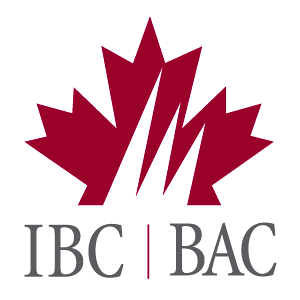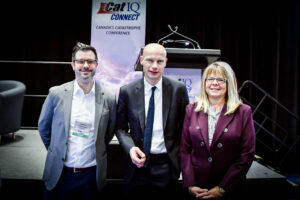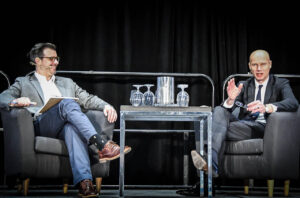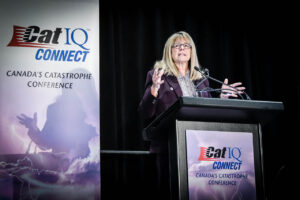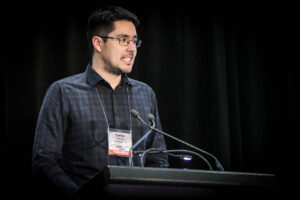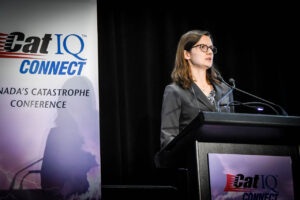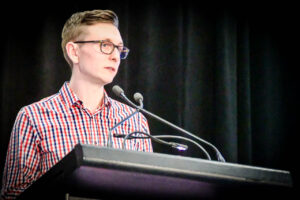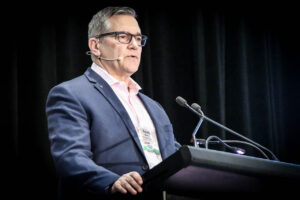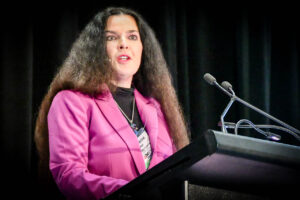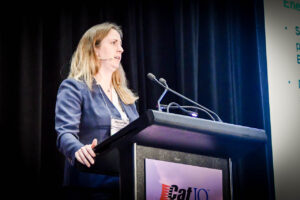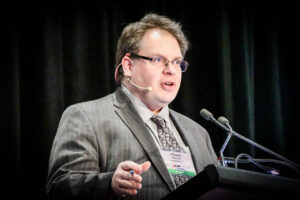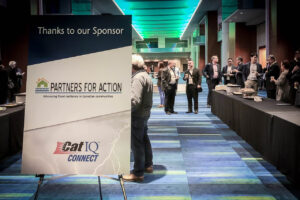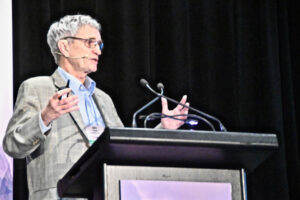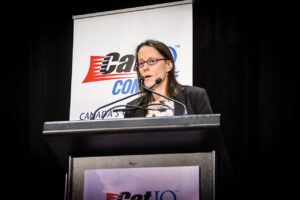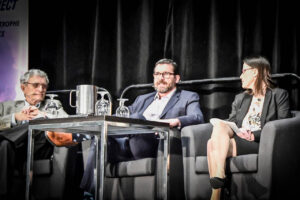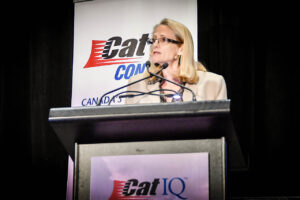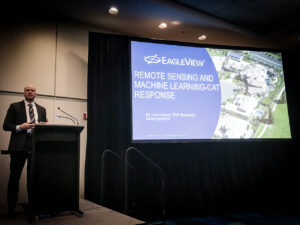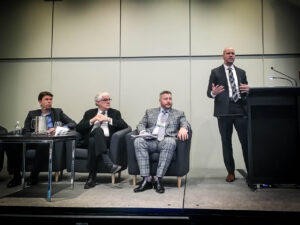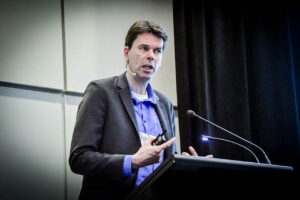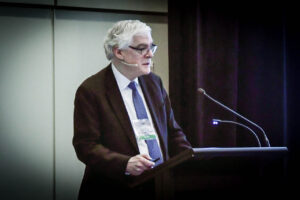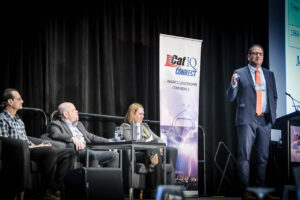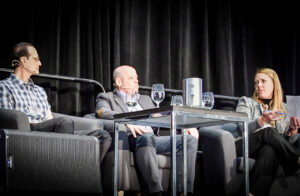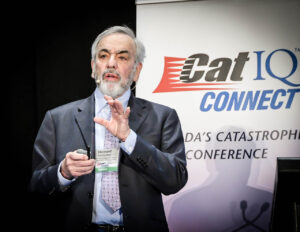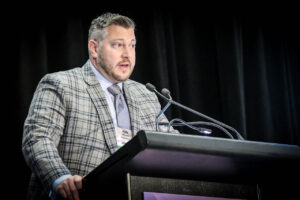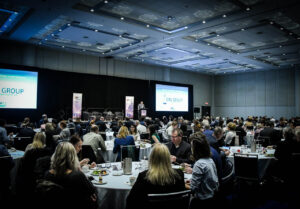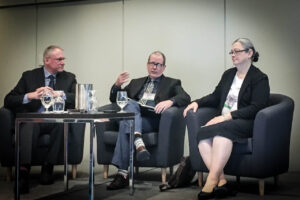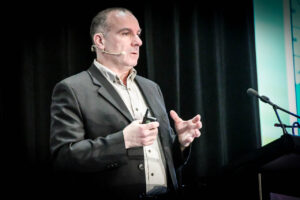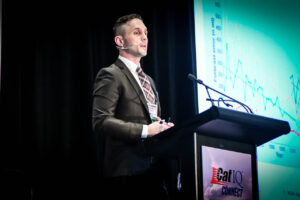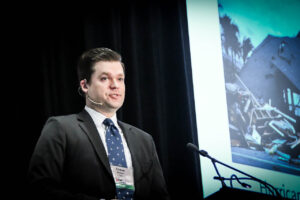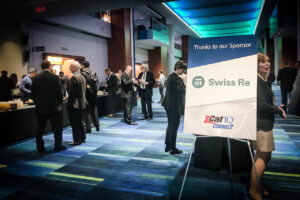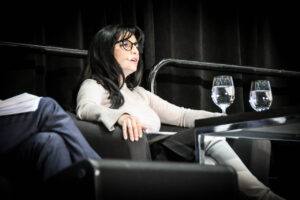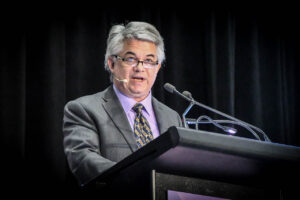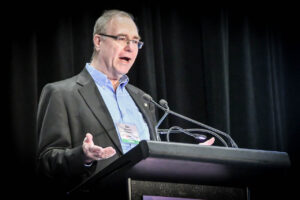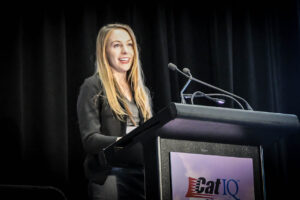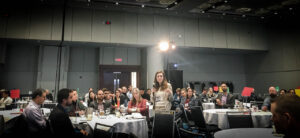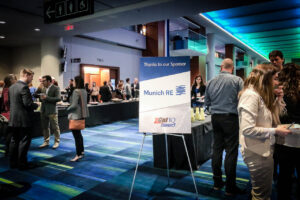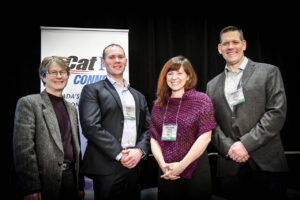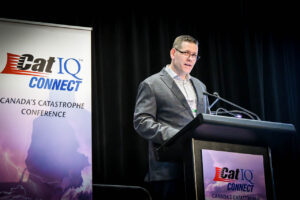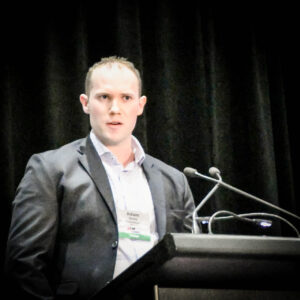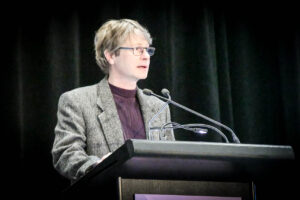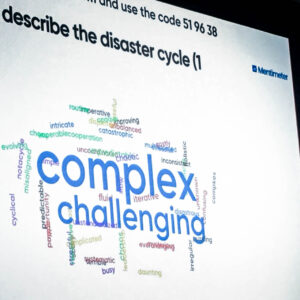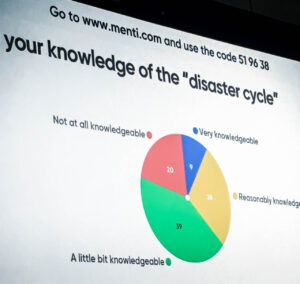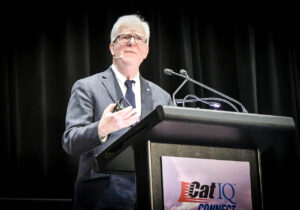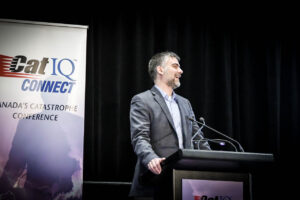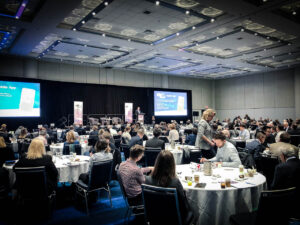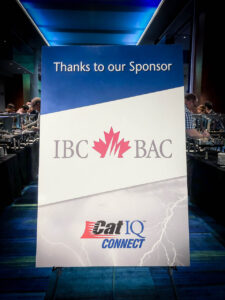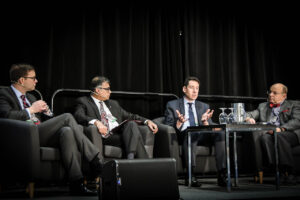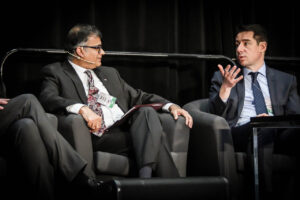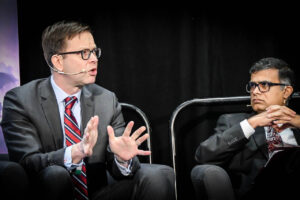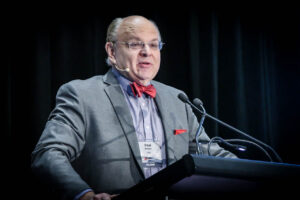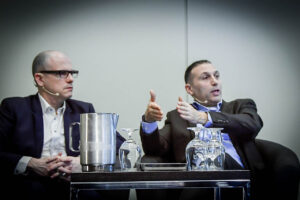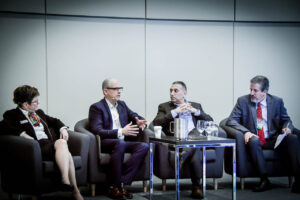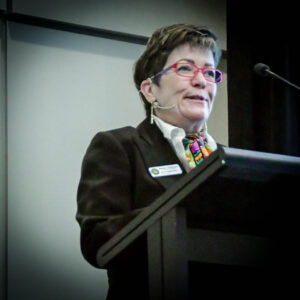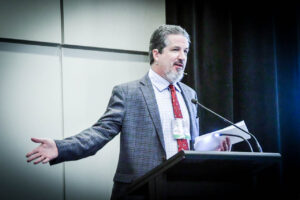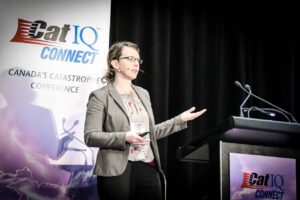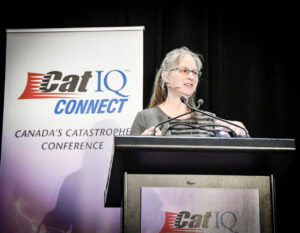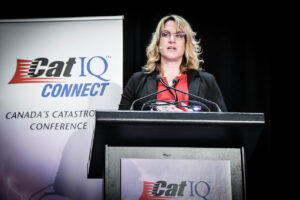Day 1 - February 4
12:00 am
-
1:00 pm
Registration Opens
1:00 pm
-
2:30 pm
Workshop hosted by FCM
The Federation of Canadian Municipalities (FCM), led by the Municipal Climate Innovation Program (MCIP), is proud to be hosting the CatIQ Conference half-day workshop on February 4th. With over 80% of Canadians living in municipalities, disasters have a major impact on where the majority of us live, work and play. This interactive workshop and Dragons’ Den style panel will focus on how municipalities respond in terms of mitigation, emergency response and recovery using real-life case studies shared by MCIP supported municipalities. Participants will then have the opportunity to pitch their solutions to a panel of Dragons.

Speaker
David Chernushenko
Vice President, Communications & Outreach
Capturing carbon in soil

Speaker
Mike Carr
Deputy Fire Chief
Saint John, New Brunswick, Canada

Speaker
Adam Davey
Director of Community Services & Public Safety
City of Prince George
3:00 pm
-
5:00 pm
Workshop hosted by FCM - Challenges & Pitches to Dragons
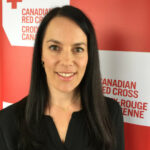
Dragon
Melanie Soler
Vice President, Emergency Management
Canadian Red Cross

Dragon
Craig Stewart
Vice President, Federal Affairs
Insurance Bureau of Canada

Dragon
Leann Hackman-Carty
Chief Executive Officer
Economic Developers Alberta

Dragon
Nirupama (Niru Nirupama) Agrawal
Associate Professor
York University

Dragon
Ewa Jackson
Managing Director
ICLEI Canada
Day 2 - February 5th 2021
8:00 am
Registration Opens
8:45 am
-
9:00 am
Welcome & Acknowledgements and Intro Address

Laura Twidle
President and CEO
Catastrophe Indices and Quantification

Jim Abraham
Past President and Fellow
Canadian Meteorological and Oceanographic Society
9:00 am
-
9:15 am
2018 CATs in Review
The conference will begin with an overview of natural and man-made catastrophes that occurred in 2018. This comprehensive review will include a chronology of events, geographic footprints of impacted areas, related media, and insured loss estimates provided by CatIQ.

Speaker
Laura Twidle
President and CEO
Catastrophe Indices and Quantification
9:15 am
-
10:15 am
Translating Climate Change and Extreme Weather into Practical Application for the Capital Markets
Some elements of the capital markets, such as Property & Casualty insurers, have been well engaged for many years regarding how to incorporate climate change and extreme weather risk into their operations. Through recent initiatives catalyzed under the direction of the Task Force on Climate-Related Financial Disclosures (TCFD) and Canadian Securities Administrators (CSA) Staff Notice 51-354 Report on Climate Change-Related Disclosure Project, climate change has now drawn the attention of a broader dimension of the capital markets – namely institutional investors, securities commissions, credit rating agencies, mortgage market of banks, and Life & Health insurers. This session will examine next steps that are required to help tangibly translate climate change and extreme weather challenges into the day-to-day workings of each of these sectors of the capital markets, thus building on the positive momentum of the TCFD and CSA 51-354.

Speaker
Blair Feltmate
Head, Intact Centre on Climate Adaptation
University of Waterloo

Speaker
Ian McPherson
CEO
Global RESP Corporation

Speaker
Tania Caceres
Principal
Risk Nexus
Morning Concurrent Session A
10:45 am
-
11:45 am
Lessons Learned on Hurricanes
An alignment of the atmospheric and oceanic environment, including warmer than normal sea-surface temperatures, resulted in 2017 being the costliest hurricane season ever in the USA (in terms of economic damage). The changes in the climate are resulting in warmer oceans, higher sea-levels, and heavier rainfalls. Furthermore, a recent study suggests that hurricanes may be moving slower in a warmer climate, resulting in even higher impacts as storms pass more slowly over populated areas. This session will review the impacts and lessons learned from recent landfalling hurricanes, and discuss changes in future risks, including the threats from these storms to Canada.

Speaker
Steve Bowen
Managing Director, Head of Catastrophe Insight
Aon

Speaker
Christopher Melhauser
AVP, Research and Development, Catastrophe Risk Management
SCOR

Speaker
Bob Robichaud
Warning Preparedness Meteorologist
Environment and Climate Change Canada
Morning Concurrent Session B
10:45 am
-
11:45 am
Nuclear Emergency – Onsite and Offsite
NIAC, the Nuclear Insurance Association of Canada, is a domestic nuclear insurance pool of Canadian Property/Casualty Insurers and Reinsurers has developed a multi-faceted, Made in Canada Claims Administration System.
The Nuclear Liability and Compensation Act (NLCA) entered into force in January 2017 that broadened heads of damages for eligible claimants and increased Operators’ limits of liability to $1Billion. This change has significantly increased funds available and the need for a new claims response approach.
While the CNSC regulates and monitors civic nuclear power, it is the responsibility of the Nuclear Operator to manage emergencies on their site and the Provincial Government’s responsibility to provide emergency response to the public off-site. NIAC offers insurance coverage and value-added expertise such as emergency claims response. Collaboratively, these stakeholders provide community resiliency in the unlikely event of a nuclear incident.
NIAC brings the complex world of nuclear to the complex world of insurance by delivering an innovative system for managing high-frequency low-touch claims. This session focuses on preparing for and responding to a man-made catastrophic event.

Speaker
Stephen Thompson
Department Manager Emergency Management
Bruce Power
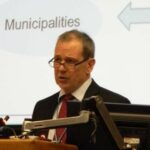
Speaker
Dave Nodwell
Deputy Chief
Office of the Fire Marshal and Emergency
11:45 am
-
1:15 pm
Keynote Address
The Ostrich Paradox: Why We Underprepare for Disasters
What factors lead individuals not to protect themselves against low-probability high-consequence events until it is too late? The errors that individuals exhibit in deciding not to purchase insurance or invest in loss reduction measures prior to a disaster can be traced to the effects of six decision biases: myopia, amnesia, optimism, inertia, simplification, and herding. Two guiding principles for insurance and a behavioral risk audit can assist in designing strategies to encourage property owners in hazard-prone areas to prepare for extreme events. Using concepts from choice architecture coupled with economic incentives, I will propose how the private and public sectors can encourage or require those at risk to protect themselves against future disaster losses.

Keynote Speaker
Howard Kunreuther
Afternoon Concurrent Session A
1:30 pm
-
2:30 pm
Climate Change: From Science to Actionable Insight
Increasingly, the climate change debate is part of the dialogue surrounding catastrophic weather events, including floods, fires, and severe weather impacting Canada. This session will bring together experts from the scientific and insurance communities to explore emerging research on how climate change may be impacting extreme weather events, and how the insurance industry is responding to a changing landscape of risk. Our panelists will discuss how we can translate data and research into actionable insight, to continue to build resiliency, and recover from weather catastrophes in Canada.

Speaker
Peter Dailey
VP, Product Management
RMS

Speaker
John Hanesiak
Professor, Department of Environment and Geography
University of Manitoba

Speaker
Adam Fenech
Associate Professor
University of Prince Edward Island
Afternoon Concurrent Session B
1:30 pm
-
2:30 pm
New Technologies & Techniques
Are you embracing new technology, or will you and your business be left behind in the digital revolution? Today, technology is making it possible for the information to be communicated more rapidly and efficiently and making images, sound, and text far clearer and better defined. The question now becomes how do we embrace this change? What steps do we take to guarantee that these new technologies aren’t just used as toys and instead become business enablers – saving time and money, enhancing productivity, and ensuring public safety. The objective of this session is to help us all understand better how the adoption of new technologies can and will impact the public and private response to the disaster.
To help us think this through, we are proposing to take a closer look at three distinct categories… communication, prediction, and the response to catastrophic events. Our panelists will discuss and highlight current and proposed initiatives, that are being undertaken to ensure that when disaster strikes, we are better able to gauge the impact through new modeling systems for forecasting or predicting future events. We will also discuss the use of targeted communications vehicles to warn the public in the effect areas through social media, and new emergency alert systems. Lastly, we will discuss how we can (potentially) better assess damages to property, in real-time, through the use of drones, satellite technology, or even via user-friendly app-based estimating devices which will enable claims companies to engage the insured in the inspection process – to streamline that process and enhance the customer experience.

Speaker
Ken Macdonald
Executive Director
Environment Canada

Speaker
Ferdinand Diermanse
Senior consultant/researcher
Deltares

Speaker
Lars Dyrud
SVP Business Development
EagleView
2:30 pm
-
3:30 pm
Lessons Learned on Recent Events
Every year municipalities and communities across Canada are faced with extreme and often devastating catastrophes. This distinguished panel will shine a light on how municipalities are preparing and adapting (or not) to recent disasters caused by fire, flood and wind.

Speaker
Ron Biggs
National Claims Director
RSA Insurance Group

Speaker
Tamsin Lyle
Principal
Ebbwater Consulting

Speaker
Jim Rook
Community Emergency Management Coordinator
Municipality of Killarney
4:00 pm
-
5:00 pm
Are Critical Services at Risk and Are They Adapting?
Disruptions to critical services, and the infrastructure that supports them, can significantly impact the health, safety, and wellbeing of Canadians. Coastal erosion, reduction in ice cover, thawing permafrost, and higher temperatures increase risks to transportation, trade, energy, health services, and food and water security. Current systems were designed based on historical data, standards, and codes that do not reflect a changing climate. They were not intended to accommodate the adverse effects of future extreme weather events or slow onset changes amplified by climate change. Costs related to these types of events are increasing and could cost Canada $21-$43 billion per year by 2050. In 2018, the British Columbia wildfire season was the largest on record in terms of hectares burned (over 1.25 million hectares). In early May 2017, a strong and prolonged precipitation event caused historic floods in eastern Ontario and western Québec. The flooding caused thousands of people to evacuate their homes, and even more were affected by the flooding. The response to the flooding required over 2,000 Canadian Armed Forces personnel to be deployed to assist in relief efforts. The 2016 Fort McMurray wildfire displaced 90,000 people, destroyed approximately 2,400 homes and other buildings, and caused disruptions in local economic activities. With insured losses in excess of $3.5 billion, this fire was the costliest insurable loss in Canada’s history. Preparing Canadians for a changing climate and maintaining critical services will require effective emergency planning and infrastructure that can withstand the impacts of climate change. This will be increasingly challenging as extreme weather events escalate and require industry, the not-for-profit sector, academia, and all levels of government to work together.

Speaker
Marianne Armstrong
Director, Climate Resilient Built Environment Initiative
National Research Council Canada

Speaker
Catherine Blair
Manager, Emergency Preparedness
Alectra Utilities

Speaker
Scott Davis
Director
International Association of Emergency Managers, Canada
5:00 pm
-
5:30 pm
Student Delegate Presentations
Day 3 - February 6th 2021
8:00 am
-
9:00 am
Breakfast
9:00 am
-
10:00 am
Fireside Chat
In this fireside chat Jason Thistlethwaite and Henk Ovink will discuss Henk Ovink’s view on living with water in relationship to climate change. Why the need to change our perspective to deal with water in relationship to climate change? Which lessons are to be learned in how to prepare cities to cope with these extreme weather conditions? How do the Dutch do this? By joining forces we can prepare for climate change factoring in heavy rainfall, periods of drought and heat, and the impact of potential floods.
Climate-proofing requires efforts on the part of a range of public and private parties. Spatial adaptation must become a self-evident component of the physical activities in urban and rural areas. In order to reduce the vulnerability of built-up areas to extreme weather conditions and the impact of a potential flood, climate-proof and water-resilient planning must become a self-evident element in spatial (re)developments, management, and maintenance. When defining objectives for a climate proof city the following questions may arise: weighting the costs and benefits, how often do we find it acceptable that flooding of a street in a neighborhood occurs? And how often is it acceptable in a shopping street where damage risk is higher? What can we do to keep the area from becoming more vulnerable? What do we want to do to make our area more resilient in case of a calamity? Which functions or buildings have to operate at all times? Do we want to prevent cellars from flooding?

Moderator
Jason Thistlethwaite
Associate Professor of Environment and Business, School of Environment, Enterprise and Development (SEED)
University of Waterloo

Speaker
Henk Ovink
Special Envoy for International Water Affairs
Kingdom of Netherlands
Session Sponsor
Morning Concurrent Session A
10:30 am
-
11:30 am
Risk Communication & Personal Action
Canadians typically are unaware of their flood risk, and are not preparing through home protection, emergency preparedness, or flood insurance. Information is available through many credible sources, but simply providing information is not enough. Residents want to understand what flood risk means for them, and the efficacy and cost of solutions to reduce this risk. This panel will explore how we can empower Canadians with realistic, solutions-oriented flood risk information to drive action towards personal, home, and community-level resiliency.

Speaker
Carrie Baron
Drainage Manager
City of Surrey

Speaker
Sandy Umbach Davis
River Engineering Team Lead
The City of Calgary
Morning Concurrent Session B
10:30 am
-
11:30 am
Codes & Standards
Codes and standards are building blocks that ensure our structures are sound, our public is protected, and our systems run efficiently. In short, they are a protective shield around you in a very complex world. They are essential to government, industry, and consumers, are effective tools towards achieving predictability and reliability and can support policy objectives.
As climate change alters how we need to function in the built environment, codes and standards are tools that will help stay ahead of this change, and as industry works to manage risk in this new normal, understanding the role standardized solutions plays has never been more important.
This session outlines the Canadian codes and standards network, how standards and guidelines are developed, and examples of real-world solutions being implemented to tackle climate change.

Speaker
Dwayne Torrey
Director, Construction and Infrastructure
CSA Group

Speaker
Philip Rizcallah
Program Director Construction Research Centre
National Research Council

Speaker
Barbara Robinson
President
Norton Engineering Inc.
11:35 am
-
12:35 pm
Mortgage Impairment Due to Earthquake Loss in Canada
For several years, insurers have been laser-focused on the institutional and systemic challenges that the P&C industry would face following a catastrophic earthquake. Studies have reinforced how a major quake would roll across the insurance sector affecting institutions and their customers. However, little attention has been given to the challenges that such an event would have across the financial sector, and particularly how it might affect mortgage lenders and the banking sector. Our panel will explore the challenges of mortgage lenders in the face of catastrophic risk, and how a more resilient housing and financial sector can be achieved.

Speaker
Hugo Gomes
Director, Capital Markets
CMHC

Speaker
Raza Hasan
Chief Risk Officer, Wealth and Personal Banking
HSBC Bank Canada

Speaker
Philipp Wassenberg
President & CEO
Munich Reinsurance Company of Canada
12:35 pm
-
2:05 pm
Keynote Address
Lunch and Presentation: Firestorm, How Wildfire Will Shape Our Future
Wildfires are burning bigger, hotter, faster and with increasing intensity thanks in part to climate change and to the fact we have aggressively fought forest fires for more than a century. These mature forests are particularly vulnerable to disease, insects, drought and to the fires that are being triggered by lightning and by an increasing number of people who live, work and recreate in forest environments. This is having a profound impact on fish and wildlife, the water we drink, the air we breathe, industries that operate in forest environments and on residents who live in forest communities. The 2016 Fort McMurray fire ended up being the costliest natural disaster in Canadian history. Only meaningful measures can prevent something like that tragedy from happening again. In this talk, Mr. Struzik will describe what government, industry, First Nations and forest communities can do to address the new wildfire paradigm that is emerging.

Moderator
Edward Struzik
Session Sponsor

















